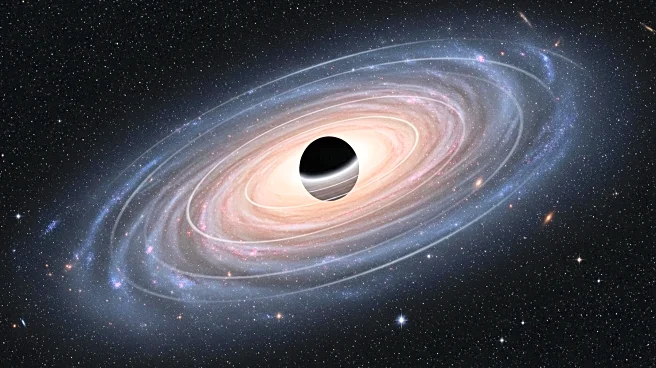What's Happening?
Recent observations from the Dark Energy Spectroscopic Instrument (DESI) suggest that black holes may play a role in generating dark energy by consuming stellar matter. This hypothesis, known as the cosmologically coupled black hole (CCBH) model, proposes that stellar material is converted into dark energy, potentially explaining the accelerated expansion of the universe. The study, published in Physical Review Letters, indicates that dark energy's role in cosmic evolution may vary over time, challenging the long-held belief that it remains constant. The research is based on data collected from the Kitt Peak National Observatory in Arizona, where DESI scans the universe with 5,000 robotic eyes, charting millions of galaxies. The findings also provide new insights into neutrino mass, aligning with current scientific understanding.
Why It's Important?
The implications of this study are significant for the field of physics, as it challenges existing theories about dark energy and cosmic expansion. If the CCBH hypothesis is correct, it could reshape our understanding of the universe's evolution and the role of black holes. This research also impacts the study of neutrinos, as it provides a new framework for understanding their mass and contribution to the universe's matter content. The findings could lead to a paradigm shift in cosmology, influencing future research and experiments. The study highlights the importance of innovative approaches in addressing complex scientific mysteries, potentially leading to breakthroughs in our understanding of the universe.
What's Next?
Further research and data collection are needed to validate the CCBH hypothesis and its implications for dark energy and cosmic expansion. Scientists will continue to test the hypothesis against existing observations and large-scale cosmological data. The DESI collaboration, involving over 900 scientists from more than 70 institutions, will play a crucial role in advancing this research. As new data emerges, the hypothesis may be confirmed or refuted, shaping the future of cosmological studies. The ongoing collaboration and scrutiny from the scientific community will be essential in determining the viability of the CCBH model.
Beyond the Headlines
The CCBH hypothesis offers a novel perspective on the relationship between black holes and dark energy, suggesting that these cosmic entities may not be merely destructive singularities but reservoirs of dark energy. This idea challenges traditional views and encourages scientists to explore unconventional theories. The study also highlights the interconnectedness of different scales in the universe, from the microscopic properties of neutrinos to the macroscopic dynamics of cosmic expansion. This interdisciplinary approach underscores the complexity of cosmological phenomena and the need for diverse scientific perspectives.










